日语N4重点句型(原日语三级)
日语三级即N4文法练习8×45题(带答案带解释)

日语三级即N4文法练习8*45题(带答案)答案在每套题后面,红色为楼主自己做的,黄色为标准答案,个别题带有解释答えはかさむ题の裏に、赤いのは家主を自分で作った、黄色いのは正解で、個別問に説明した三級文法1(1) 3時間____歩いたので、のどがかわきました。
1も2と3に4を(2) おばあさんが元気だ_____いいんだけどね。
1で2か3が4と(3) このピアノはへんな音_____します。
1が2に3を4で(4) かお色が悪いけどどうした____.1の2な3かい4だい(5) そんなきたない服、着る____.1だよ2なよ3だか4ないか(6) 新しいカメラを買わないで、わたしのを使えばよかった_____.1まで2でも3のに4だけ(7) とてもかんたんな料理だから3分 ____できますよ。
1に2で3ほど4ぐらい(8) もうおそい____、つかれたから、まっすぐうちに帰ろう。
1と2し3が4で(9) わたしはできませんがむすこ____やらせてみましょう1を2が3に4で(10) バイオリン____ギター____どちらがやさしいですか。
1や/や ?2と/と3が/が4も/も(11) その道____、右へ行くと、駅があります。
1で2へ3に4を(12) 朝早くさんぽするの_____すきなんです。
1に2で3が4を(13) きっぷをどこで買う_____教えてください。
1と2も3を4か(14) ちょっと見る____かんたんそうだけれども、ほんとうはむずかしい。
1と2ば3が4は(15)「もしもし。
みちこさん、いらっしゃいますか。
」「みちこですか。
みちこ____もう出かけましたけれど」。
1が2を3でも4なら(16)こちらのワイシャツのほうが少し_____ございます。
1お高う2お高い3高いに4高いで(17)わたしは山田先生を6時までここで____.1お待ちいたします2お待ちいただきます3お待たせになります4お待たせいただきます(18)弟はけさご飯を_____学校へ行きました。
N4考试必备词汇700+(自测版1)
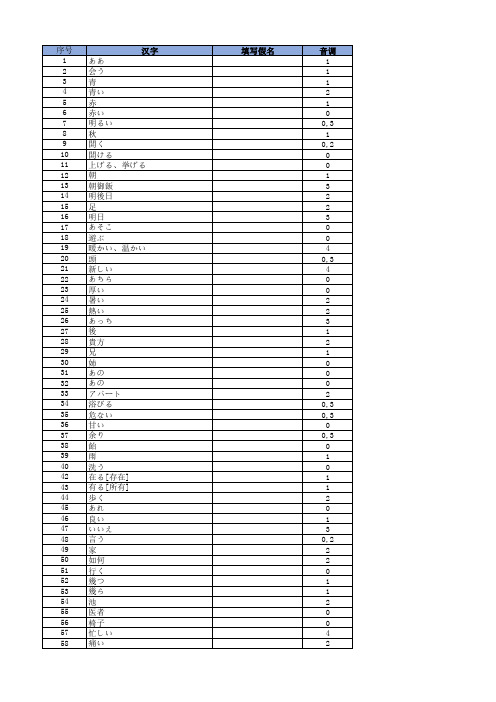
2,4 0 3 2 0
1 0,1
1 0 1 2 0 1 0 0,3 0 3 1 1
1
0 0,3
0 0 1 1 3 0 1 4 2 1 2,3 0,6(7) 0 4 3 0 0 3 0 0 1 1 2 6 5 0
0 0 0 5 1 5
291 さあ 292 〜歳 293 財布 294 魚 295 先 296 咲く 297 作文 298 さす「傘をさす」 299 〜冊 300 雑誌 301 砂糖 302 寒い 303 さよなら/左様なら。 304 再来年 305 三 306 〜さん「様」 307 散歩(する) 308 四 309 〜時 310 塩 311 然し 312 時間 313 〜時間 314 仕事 315 辞書 316 静か 317 下 318 七 319 質問 320 失礼-しました。 321 失礼-します。 322 自転車 323 自動車 324 死ぬ 325 字引 326 自分 327 閉まる 328 閉める 329 締める 330 じゃ/じゃあ 331 写真 332 shirt 333 shower 334 〜中 335 十 336 〜週間 337 授業 338 宿題 339 上手 340 丈夫 341 醤油 342 食堂 343 知る 344 白 345 白い 346 〜人 347 新聞 348 水曜日
0 2 2
1 3 2 3
2 2 2 1,2 4 1 1,2 0 0 1 1 1 0 0 2 1 1 1 0 3 0 1 1 0 0 0 0 3 1 0 1 1 0 0 3
0 3 3 1 0 0 0 0 2 2 3/0 1 0
407 出す
1
408 〜達
409 立つ
1
410 縦
1
411 建物
日语n4重点句型(原日语三级)(Japanese N4 key sentence pattern (original Japanese three level))
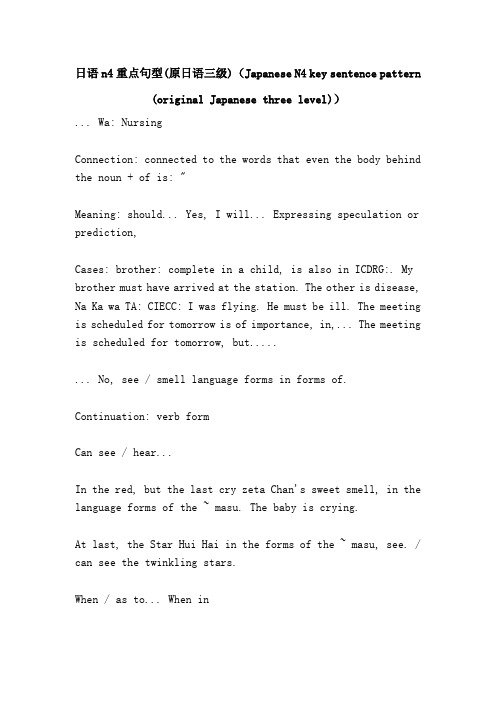
日语n4重点句型(原日语三级)(Japanese N4 key sentence pattern (original Japanese three level))... Wa: NursingConnection: connected to the words that even the body behind the noun + of is: "Meaning: should... Yes, I will... Expressing speculation or prediction,Cases: brother: complete in a child, is also in ICDRG:. My brother must have arrived at the station. The other is disease, Na Ka wa TA: CIECC: I was flying. He must be ill. The meeting is scheduled for tomorrow is of importance, in,... The meeting is scheduled for tomorrow, but........ No, see / smell language forms in forms of.Continuation: verb formCan see / hear...In the red, but the last cry zeta Chan's sweet smell, in the language forms of the ~ masu. The baby is crying.At last, the Star Hui Hai in the forms of the ~ masu, see. / can see the twinkling stars.When / as to... When inConnection: connected to the words that even the body behind the "noun + Ni" of timeMeaning:... TimeExample: 1: on line and pulp leak in, or buy a timepiece with u. Buy a watch when you go to Paris. The leak on line: after pulp and paint on, or buy a complete timepiece. When you go to Paris, buy a watch. The son of her, for when we live on in pulp was ICDRG. When I was young, I lived in Paris.... Tameni (reason)Connection: connected to the words that even the body behind the noun of tameni "Meaning: because... As a result of... MeansIn the accident, for thou after tameni, after the last tram stop, Ma. The tram stopped because of the accident. The traffic inconvenience, Na tameni, development, Chi terms at last. The development is backward because the traffic is not convenient. The typhoon of tameni, fall, terms. The house was damaged because of the typhoon.... Tameni (reason)Connection: connected to the words that even the body behind the noun of tameni "Meaning: in order to... The purpose of the car, or buy a completetameni storage. At last in gold. Save money to buy a car. The station of Beijing by tameni hyperplastic. / go to Beijing for the exams?.... You told me that over this childConnection: connected to the verb shape behind the noun + of this feeling of child "Meaning: intend to... The will, plan, plan, and so forth are very likely to be implemented.What is today: - this sweet feeling. Moo moo nursing. I'm going to do nothing today.... (TA) and was nursingAfter the verb ":" + "or" - in the pastMeaning: just now...For example: Food and nursing language. I just finished my lunch.... And was nursingContinuation: after the basic form of the verbMeaning: just about...Example: this food in and was nursing. I'm about to have dinner.... At last in advance and nursingConnection: "the verb" + "the shape"Meaning: right now...Example: this food at last in advance and nursing. I'm eating now.... squareContinuation: after the verb is used in conjunctionMeaning:... Method.Of this party is divided sushi of this ~ masu Ka ka. Do you know the way to make sushi? The language of the cellular phone of the last party or the last national importance on teaching forms. Could you tell me how to use this cell phone?.And, and, after ~ ~Continued: after verb / Adjective + noun, behind the ordinary body nursingList of words,... ... LaExample: Sunday, and is barely in cleaning and expands the ~ masu Ka. You can study and clean your room on Sunday.To master this speechContinuation: after the common bodyMeaning: do all... Only... , (past tense verbs after "speech," said just this...)This speech as an example: This was on the last reading of Ma Na Hai national importance. / don't just read.I will ~After a few words:Meaning: no....Example: 2 O / second times.~ Ma De inContinuation: following the general bodyUntil...Example: Gui in private, as in the home of Ma De Hai Hai on the national importance. Please stay at home until I come back.~ karaRepeat: speak behindMeaning: by... Make up ofExample: Japan is more on the island of Kara - after the last ~ masu. Japan is made up of many islands.~Continuation: the basic form of a verb, followed by a noun.Meaning: the benchmark for comparison, usually (as compared to what), no, no....... The more... The more...Example: in August last summer, I was a child, in July: CIECC thou this Ma's estate. /8 months are very hot and July is not so hot.~ (cancer) in nursingConnection: words even body noun + "- of importanceUsed to explain and explain something, or to sum up and summarize somethingOf the woman to complete Na Ka for cancer, I was flying. Why didn't you come? The winter of this year is cold in here live on. It's a cold winter this year.~ nadoUsed as an exampleExample: on the machine of cost and, and at last, the dictionary nado thou this ~ masu. There are books, dictionaries, etc on the desk.(~ was. For thou..).Continuation: conjoined words are divided into near, middle, remote, and interrogative. Must afterBody language.Meaning: the one, that is, example: language of timepiece is San was still in the field. This watch is for Tanaka. (say) for the "Tanaka San De of time here. / that watch is Tanaka's.. (said) Thou of Tanaka San De of timepiece is also. / that watch is Tanaka's.. (far) of Wa Tanaka San in the clock here. Which watch is Tanaka's? (doubt)(~ was. For thou. Terms.)Continuation: demonstrative pronoun and place pronoun, divided into near, middle, remote, and interrogative.Which one, that one, that one, which?Example: language terms: I was a timepiece. This is the watch. (known for nearly): I was a timepiece that made me cry. / that's the watch. (said): I was when thou terms. / that's the watch. (far) terms: Tanaka San was still in time. Which is Tanaka's watch? (doubt)And... On continuedConnection: Verb + and + ~ masu form.Meaning: kensonggo, with modest expressed to the hearer's respect.Example: Mr. of bearing material, and is private and holding the ~ masu UTI. Teacher's luggage, I'll get it for you.... The ARUContinuation: verb used in conjunctionMeaning: indicates the existing situation of action. "Already."... Now","... All right"Example: in the dictionary of machine on, at last this thou ~ masu. The dictionary has been put on the table.... The ~ U.Continuation: verb used in conjunctionMeaning: Act, end all, sometimes express complete, irrevocable, regretful mood.Example: persistent questions or forget the terms of Ma hyperplastic. I forgot my homework.... In terms on theContinuation: verb used in conjunctionThe act of expressing someone as a speaker (or a person on the speaker's side). This is for example: in the language and has resolved in the case of guys, forms on the terms. He gave it to me.... The child becomes longerContinuation: verb used in conjunctionMeaning: the act of saying that the speaker (or the person on the other side of the speaker) accepts someone else's actions for himself.Example: Wang San wa Tanaka San in Japanese has taught at last forms of MoO RA ~ masu. Mr. Wang asked Mr. Tanaka to teach him japanese.... At last on theContinuation: verb used in conjunctionMeaning: said mobile subject from the speaker's sight from the near to the distant. "... Go"With the flying machine, on the fly's live in far back with hyperplastic ma. The plane flew far away.... And on theContinuation: verb used in conjunctionMeans to make certain preparations in advance. "In advance... Yes, "(do)... Good"Example: guest San, and to in tameni, and, after the woman has bought with hyperplastic and ma. The guests are coming, so they bought some refreshments beforehand.... The construct.Continuation: verb used in conjunctionMeaning: try to see. Try more or less for some experience. "... Try","... See"Example: all, and sweet. Sweet and sweet words after the food, in the Kara construct. Everybody said it was delicious, so I tasted it.... The on.Continuation: verb used in conjunctionMeaning: the moving subject is far and near to the speaker. "... To"Example: by analysis and.! , Hikaru, flying in with cancer for yo! Careful! The ball flew over!... But, inContinuation: verb used in conjunctionThe act of representing a speaker (or speaker of a person) for someone else. For example: a brother in Japanese guys. Or, the teaching forms of this ~ masu. I teach Japanese to my brother.... KaConnection: follow the termination typeQuestion auxiliary wordExample: test, when in the beginning, after the last known in ~ ~ masu ka. Do you know when the test will begin?... GA.Connection: adjective stemMeaning: a third person mental state.Example: Zhang San is on line with Japan, after the last ~ masu ta. Mr. Zhang is thinking of going to japan.... We live onConnection: connected to the verb "~ masu".Meaning: difficult to do....Example: language terms: after this, J and UTI in de ne I live on. This is a bit difficult.... I live forConnection: connected to the verb "~ masu".Expression means easy....Example: language of the dictionary is to live, and I was a sweet child here. This dictionary is very easy to use.... You guys.Continuation: verb used in conjunctionMeaning: end... Finish...For example: actually, last words - end after TA RA, private guys of the last words heard on the child to construct the national importance to live. Your words are finished, and listen to what I say.... I.Connection: verb, adjective, adjective verb stems.Excessive... Too...The problem is difficult in cases: language. Also, the in termsof child nursing, with Ma's estate by. / the problem is too difficult for anyone to do.... The smell or see in / onContinuation: verb formLook / hear...CasesPlease see that I used to do. And as I 请看. Asked whether his father's praise. Listen to the father 亲表扬 Mexico, Mexico.... Starting续: 动词连用 contact formWill: 开始...Example: in September, and starts to lower temperature. And there is a , air temperature on September 开始 downturn.... StayContact 续: "it 动词 adjective suffix 'Ko said that Prince 动词 remains as" "name" lyrics"It will remain a certain 一种状态的持续:①(「). ②(「 (left) and the front 一样不发生变化:... In , on... , on an original...Speaking with an example used to sit down. Or sitting in 说话. You can stay up for shoes. And 鞋进 can come through. This is the same as that in a long time ago, inconvenient. And 这附 near or past 一样, not expedient.... Continue to续: 动词连用 contact formWill: 续地...Example: he to do this work. And 一直做这个工作.... (purpose)续: 动词连体 contact formWill: for... ,为了...This machine is used to report the use of paper cutting. Yu 纸desk for court and this is. It takes an hour to go to the company. And no one 个小 Ryo 为去 flower Co., Ltd..I think via)Contact: 续动词 proactive form surface will form in the EmpressIntention: "will display , sou... Calculation ,... "Example: today I think I'll take a rest slowly. And now need a good rest at the side.To May续: verbal form after 终止 contact surfaceThe display has a certain 种 intention: a possible ,一般是发生可能比较小或者是不愿该事情发生的情况Another example: he may know. 许已经知 way or other.To say so续 contact: contact surfaces in basic 动词 EmpressWill: 传达 display contentExample: please tell Mr. Wang so as not to be late for the meeting. And the king 迟到 Ryo 请告诉小 convention.WhetherContact: contact surface in 续简体 EmpressDecision: whether... , Yu ", etc.... Or not? "Example: I try to listen to what Mr. Wang go? 问一下小王到底去还是不去 QuThat is, via)Contact: contact 续 in physical form 动词动去 EmpressThe display has a 过某 intention: used to be 种经历Example: I have climbed Mt. Fuji. 爬过 and Mt. Fuji.To make a to do续 contact: contact name and face shape 词以动词连体EmpressDisplay individual intention: define a contact name ,词后display is determined by 选择么,动词 display is determined by the empress, certain circumstancesWhat an example used to drink. And 饮料 point calculation and 么 utensil. Whether you juice. And on the 桔子 juice.Prefer toIn the past 续 contact: contact type surface contact with the empress 较多,时也 empress in basic level.Ken: 议和 will display 劝告, "the..." "... 为好 "Example: it is cold, you had better wear a coat. And in this 很冷, mantle and formed on the holding.And, via)Contact: contact 续 in any form will 动词 empress type surfaceWill: 1, the display 一个动作正要开始或结束, "major positive..." 2, 尝试 display as a certain 一行为 efforts.An example used to enter the bath when the telephone. The main positive side of bath, cartoon, , Tel coming. 2 son is trying to Kyoto University north. And my 儿子 calculation on irikita Kyoto University.And it续 contact: contact surface shape in 动词连体 EmpressWill: define... But , and... Differential , is 一个组织等作出的决定, that individual is determined.Example: because of the typhoon, it has to stop the game. In the wind and 为台 cancellation ratio is determined , Lindsay Lohan goes chic.To become续 contact: contact surfaces in basic 动词 Empress Intention: Study of "动作 display in ,变得..."Example: the child, so that her husband to do the housework. And this child has a strong finish in ,变得一些家务了society was considered.Never mindContact: 续 may be 动词连用 form.Intention: "... Tatsuya JP system "and" , died... It is near phase.Example: you can increase a little. High 一点也没关系redesign.And it is the sameIt is the same with 续: substantive.Will: and... Homology.Example: the king's bag is the same as my bag. Small follicle and my king phase.As toContinuation: the basic form of a verb, followed by a noun.Meaning: the benchmark for comparison, usually (as compared to what), no, no.... Yue... More example: in August last summer, I was a child, in July: CIECC thou this Ma's estate. /8 months are very hot and July is not so hot.To complete, RA taConnection: Verb + TA Ka RA u shape.Meaning: to say, "... What do you mean?.Example: I'm woman and wine or drink in case of cancer U I was kind of construct. Would you like to try some wine?~, I.Connection: only for front, and sense the term "in the sweet taste, feeling, and, and nado.Meaning: equivalent to, feel, feel ~.Example: language is to have a taste of the meat, on continued change. This sense of smell / meat.In hyperplastic, after the ~Continuation: a noun or verb followed by a figureMeaning: 1, follow the noun, follow... (instruction, etc.) "; 2; behind the verb;" with..."Example: in order, after the hyperplastic was complete. The complete on live national importance. Follow the orders.Possible stateConnection: five segment verbs, the suffix kana, changed into forms of kana + in section.Example: buy, buy in and complete forms of words, words I hold to hold the estate in feeling.A section of the verb suffix in RA + removed in terms.Cases:, RA in tune in termsThe change of those verbs, put on continued change in with.Example: to illustrate that on continued in with.The change in the form of a verb, to change language kind in terms.Express a certain capacity or possibility.Example: in English, reading news: private will ~ masu. / I can read English newspapers.The house was in graduate studies, clima ~ masu Ka suction forms. Is it possible to smoke in this room?To complete and.Connection: words and contrary to u +.Meaning: and... Different.Cases of private test forms: Wang San Hai of and against the ~ masu. My ideas are different from Xiao Wang's..At last, in this speech toConnection: Verb + speech, this form the last.Means to do something repeatedly, almost without doing anything else, as far as possible.For example: On Tour de - in cancer, live in this speech and, in terms of the estate's yo ~. If you play that game, you won't be able to go to college.And to live longerMeaning: call... Of or relating to contentExample: and thou, San San, in the wild and live longer, after people Kara phone actually for yo. / mom, there's a call from china.。
日语n4语法总结
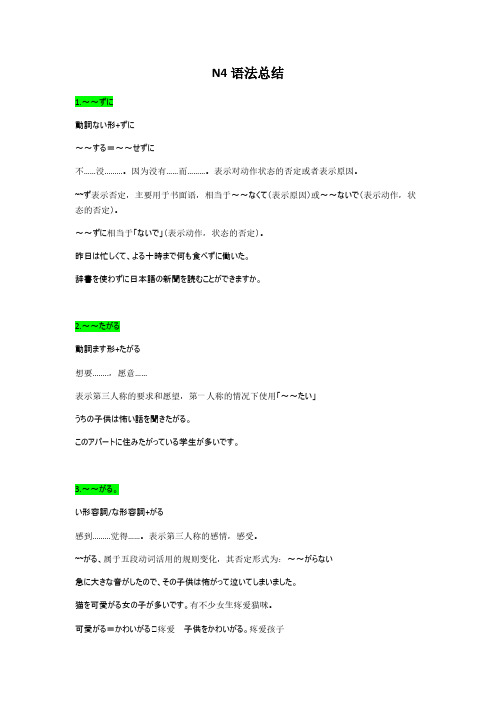
N4语法总结1.~~ずに動詞ない形+ずに~~する=~~せずに不……没………。
因为没有……而………。
表示对动作状态的否定或者表示原因。
~~ず表示否定,主要用于书面语,相当于~~なくて(表示原因)或~~ないで(表示动作,状态的否定)。
~~ずに相当于「ないで」(表示动作,状态的否定)。
昨日は忙しくて、よる十時まで何も食べずに働いた。
辞書を使わずに日本語の新聞を読むことができますか。
2.~~たがる動詞ます形+たがる想要……..,愿意……表示第三人称的要求和愿望,第一人称的情况下使用「~~たい」うちの子供は怖い話を聞きたがる。
このアパートに住みたがっている学生が多いです。
3.~~がる。
い形容詞/な形容詞+がる感到………觉得……。
表示第三人称的感情,感受。
~~がる、属于五段动词活用的规则变化,其否定形式为:~~がらない急に大きな音がしたので、その子供は怖がって泣いてしまいました。
猫を可愛がる女の子が多いです。
有不少女生疼爱猫咪。
可愛がる=かわいがる 疼爱子供をかわいがる。
疼爱孩子4.~~そうだ。
動詞简体/いな +そうだ名詞+だ听说~~~、据说~~~。
是传闻助动词~~そうだ表示间接获得情报,因此不能变成否定和过去式。
如果要表示否定的意思,则应该在~~そうだ前面的内容上加否定。
且传闻助动词~~そうだ。
经常与表示信息来源的「~~によると/~によれば/~~のはなしでは」等呼应使用。
来週うちの近くでお祭りがあるそうです。
友達によると、去年の試験は簡単だったそうです。
友達の話では新しい辞書はとてもいいそうです。
5.~~そうだ。
動詞ます形い形容詞去い +そうだな形容詞いい=良さそうです。
ない=なさそうです。
好像…….,似乎………,眼看就要…………,是样态助动词山田先生はいつも難しそうな本を読んでいます。
石田さんが忙しそうだから、手伝いましょう。
ポケットから財布が落ちそうだよ。
6.~~ようだ。
各类词名词修饰体+ようだ1)像~~~~一样。
日本语前线N4教程语法总结
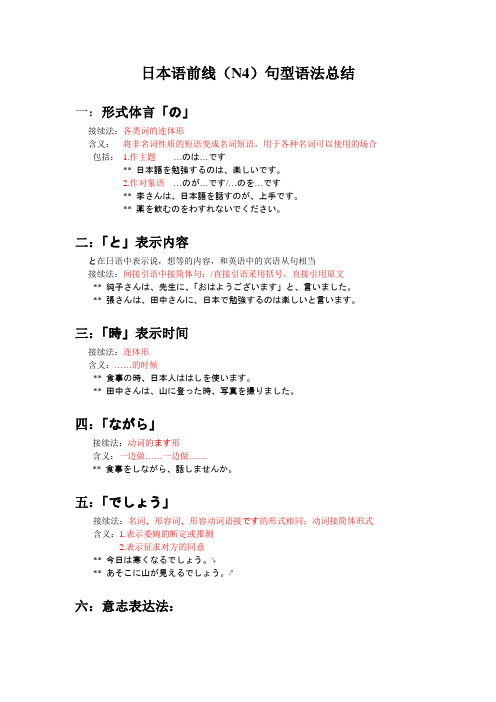
日本语前线(N4)句型语法总结一:形式体言「の」接续法:各类词的连体形含义:将非名词性质的短语变成名词短语,用于各种名词可以使用的场合包括:1.作主题…のは…です** 日本語を勉強するのは、楽しいです。
2.作对象语…のが…です/…のを…です** 李さんは、日本語を話すのが、上手です。
** 薬を飲むのをわすれないでください。
二:「と」表示内容と在日语中表示说,想等的内容,和英语中的宾语从句相当接续法:间接引语中接简体句;/直接引语采用括号,直接引用原文** 純子さんは、先生に、「おはようございます」と、言いました。
** 張さんは、田中さんに、日本で勉強するのは楽しいと言います。
三:「時」表示时间接续法:连体形含义:……的时候** 食事の時、日本人ははしを使います。
** 田中さんは、山に登った時、写真を撮りました。
四:「ながら」接续法:动词的ます形含义:一边做……一边做……** 食事をしながら、話しませんか。
五:「でしょう」接续法:名词、形容词、形容动词语接です的形式相同;动词接简体形式含义:1.表示委婉的断定或推测2.表示征求对方的同意** 今日は寒くなるでしょう。
↘** あそこに山が見えるでしょう。
↗六:意志表达法:含义:表达人的意志,经常与と思います搭配使用,如果后面要接名词采用う/ようとする的形式** 夏休みには、海へ行こうと思います。
七:「ので」接续法:连体形(名词采用なので的形式)含义:表示原因** 頭が痛いので、仕事を休みました。
八:「かもしれません」接续法:形容词/动词的普通体,名词/形动词干+かもしれません含义:说话人的推测,也许……** 空が暗いですから、午後から雨が降るかもしれません。
九:授受关系不仅可以用于东西的授受,也用于动作的授受(此含义时接在动词的て形后)~~てさしあげる/~~てあげる/~~てやる~~ていただく/~~てもらう~~てくださる/~~てくれる**みなさん、読んでもらいましょう。
日语能力考试N4十大常见问题讲解

1、关于は和が的用法问:1.郵便局( )どこですか。
答案是:は2.どれ( )あなたの鍵ですか。
答案是:が为什么1选は不选が为什么2选が不选は①当疑问词作谓语以及回答这种句子时用「は」。
如:山田先生はどなたですか。
山田先生はこの方です。
/山田先生是哪位?山田先生是这位。
あなたのカバンはどれですか。
わたしのカバンはこれです。
/你的皮包是哪个?我的皮包是这个。
②当疑问词作主语以及回答这种句子时用「が」。
如:どなたが山田先生ですか。
この方が山田先生です。
/哪位是山田先生?这位是山田先生。
どれがあなたのかさですか。
これがわたしのかさです。
/哪个是你的伞?这是我的伞。
だれが行きますか。
私が行きます。
/谁去?我去。
2、助词「を」与「で」表示地点时的区别问:"今市役所の前をあるいています。
""市役所の前"不是地点吗?为什么用"を"不用"で"?「を」表示的是“经过、通过、离开的场所”,用在「を」后面的动作一般具有一定的方向性。
「で」表示的“动作进行的场所”,用在「で」后面的动作并没有明确的方向性。
“在市政所前面走着”并不是在市政所前面漫无目的地“走来走去”,而只是“走路通过市政府前面”而已,所以用「で」不如「を」合适。
3、关于授受动词问:森さん( )わたしたち( )ホテル( )案内してくれました。
①をでに②はをまで③にはを④はにまで答案:按照句型"誰をとこへ(まで)案内する”,选择2。
但是くれる的句型不是「名词1は私に~てくれます」这样的么?动作发出主题用「は」提示,接收方用「に」提示。
在授受关系的句子中:甲が/は、乙(我/我们/我的家人或朋友)に/から~动词「て形」+くれる・くださる甲が/は、乙に/から~动词「て形」+もらう・いただく甲が/は、乙に/から~动词「て形」+さしあげる・あげる・やる(1)当乙方为后面动词的宾语的时候,乙方不能用「に」而要用「を」。
日语N4(3)级考试分类单词之五段动词
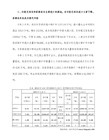
30 おこる 怒る 生气
31 おっしゃる 说(いう的敬语)
32 おどる 踊る 跳舞,舞蹈
33 おどろく 驚く 惊讶
34 おもいだす 思い出す 想起
35 おもう 思う 想,认为
7 すく 饥饿;变少
8 とまる 泊まる 投宿;(船)停泊
9 なおる 治る 治好,痊愈
10 まいる 参る 可以;(自谦)来去;认输
11 わかす 沸かす 烧开,使沸腾
12 たす 足す 够;加,增加
13 こわす 壊す 毁坏,损害
21 いのる 祈る 祈祷,祝福
22 いらっしゃる 在,去,来(敬语)
23 うごく 動く 转动
24 うつ 打つ 打,敲,拍
25 うつす 写す 抄,摹写,描写
26 うつる 移る 移动,转移
27 えらぶ 選ぶ 挑选,选择
66 わる 割る 打坏,弄碎
67 わらう 笑う 笑
68 はこぶ 運ぶ 运输,装运
69 はらう 払う 支付,付
70 ひっこす 引っ越す 搬家
71 ひろう 拾う 拾,拣
72 ふむ 踏む 踩,踏
73 ふやす 増やす 增加
五段动词
番号 単語 漢字 意味
1 かまう (常用否定式)(没)关系,(不)介意
2 くだる 下る 下降
3 さわる 触る 摸,触
4 ふとる 太る 胖,肥胖
5 ぬる 塗る 涂,抹
6 あやまる 謝る 认错,道歉,认输
52 てつだう 手伝う 帮忙
53 とおる 通る 通过
54 なおす 直す 改正,修改,修理;改~,重~
日语N4词汇总结

日语等级考试四级单词:重点词汇(1)ああ啊あう(会う)会见、相见あおい(青い)蓝的、蓝色的あかい(赤い)红的、红色的あかるい(明るい)明亮的あき(秋)秋天あく(開く)开あける(開ける)打开あげる「手を上げる」举「举手」あさ(朝)早晨あさごはん(朝御飯)早饭あさって后天あし(足)脚、足あした明天あそこ那边、那儿あそぶ(遊ぶ)玩耍あたたかい(暖かい)暖和的あたま(頭)头あたらしい(新しい)新、新的あちら那边、那儿あつい(暑い)热、热的あつい(熱い)热、热的あつい(厚い)厚的あと(後)后、后边あなた你あに(兄)哥哥あね(姉)姐姐あの那个あの嗯アパート公寓あびる「水をあびる」淋「淋浴」あぶない(危ない)危险的あまい(甘い)甜的あまり不太、不怎么(后接否定)あめ(雨)雨あらう(洗う)洗涤ある在ある有あるく(歩く)步行あれ那个いい/よい好いいえ不いう(言う)说いえ(家)家いく/ゆく(行く)去いくつ几个、多少いくら多少日语等级考试四级单词:重点词汇(2)いけ(池)池塘いしゃ(医者)医生いす(椅子)椅子いそがしい(忙しい)忙的、繁忙的いたい(痛い)疼痛的いち(一)一いちにち(一日)一天いちばん第一、最いつ何时いつか(五日)五日、五号いっしょ(一緒)一起、一块儿いつつ(五つ)五个いつも总是、不断いま(今)现在いみ(意味)意思、意味いもうと(妹)さん妹妹いや(嫌)不喜欢、讨厌いりぐち(入り口)入口いる(居る)在いる(要る)要いれる(入れる)放入いろ(色)颜色いろいろ各种各样うえ(上)上うしろ(後ろ)后うすい(薄い)薄的うた(歌)歌うたう(歌う)唱歌うち「わたしのうち」家「我的家」うまれる(生まれる)出生うみ(海)海うる(売る)卖うわぎ(上着)外衣、上衣え(絵)画えいが(映画)电影えいがかん(映画館)电影院えいご(英語)英语ええ是的えき(駅)车站エレベーター电梯~えん(~円)~日元えんぴつ(鉛筆)铅笔お~喔おいしい香、好吃的おいでになる来、去、在おおきい(大きい)大的おおぜい(大勢)众多的おかあさん(お母さん)妈妈、母亲おかし(お菓子)点心、糕点おかね(お金)钱おきる(起きる)起来おく(置く)放置日语等级考试四级单词:重点词汇(3)おくさん(奥さん)妻子、太太おくる(送る)送おさけ(お酒)酒おさら(お皿)盘子おじ(伯父・叔父)さん伯父、叔父おじいさん爷爷、祖父おしえる(教える)教、教诲おす(押す)推、压おそい(遅い)迟的、慢的おちゃ(お茶)茶おてあらい(お手洗い)洗手おとうさん(お父さん)爸爸、父亲おとうと(弟)さん弟弟おとこ(男)男子おとこのこ(男の子)男孩おととい前天おととし前年おとな(大人)大人おなか腹、肚子おなじ(同じ)同样おにいさん(お兄さん)哥哥おねえさん(お姉さん)姐姐おば(伯母・叔母)さん伯母おばあさん奶奶、姥姥、祖母おべんとう(お弁当)盒饭おぼえる(覚える)记住、学会おもい(重い)重、沉重的おもしろい有趣的およぐ(泳ぐ)游泳おりる(降りる)下降おわる(終わる)结束おんがく(音楽)音乐おんな(女)女子おんなのこ(女の子)女孩日语等级考试四级单词:重点词汇(4)~かい(~回)回~かい(~階)层がいこく(外国)外国がいこくじん(外国人)外国人かいしゃ(会社)公司かいだん(階段)楼梯、台阶かいもの(買い物)购物かう(買う)买かえす(返す)返还かえる(帰る)回归かお(顔)脸かかる[時間がかかる]花费[花时间]かぎ钥匙かく(書く)写がくせい(学生)学生~かげつ(~か月)~个月かける「眼鏡をかける」带「带眼鏡」かける「電話をかける」挂「挂电话」かさ(傘)伞かす(貸す)借给、出租かぜ(風)风かぜ(風邪)伤风、感冒かぞく(家族)家庭かた「この方」对人敬称[这位先生、这位女士]かたかな(片仮名)片假名~がつ(~月)~月がっこう(学校)学校かど(角)角、角落かない(家内)妻子かばん包、皮包かびん(花瓶)花瓶かぶる戴、盖かみ(紙)纸カメラ照相机かようび(火曜日)星期二からい(辛い)辣、辣味的日语等级考试四级单词:重点词汇(5)カレンダー日历かわ(川/河)河、江~がわ(~側)边かわいい可爱的かんじ(漢字)汉字き(木)树きいろい(黄色い)黄色的きえる(消える)消失きく(聞く)听きた(北)北、北方ギター吉他きたない(汚い)肮脏的きっさてん(喫茶店)咖啡屋きっぷ(切符)票、劵きのう(昨日)昨天きゅう(九)九ぎゅうにく(牛肉)牛肉ぎゅうにゅう(牛乳)牛奶きょう(今日)今天きょうしつ(教室)教室きょうだい(兄弟)兄弟きょねん(去年)去年きらい(嫌い)讨厌、嫌恶きる(切る)切、裁きる(着る)穿きれい漂亮キロ[キログラム]公斤キロ[キロメートル]公里ぎんこう(銀行)银行きんじょ(近所)附近きんようび(金曜日)星期五く(九)九ぐあい(具合)状况、情形くすり(薬)药ください请~くだもの(果物)水果くち(口)口、嘴くつ(靴)鞋子くつした(靴下)袜子くに(国)国、国家くもる(曇る)天阴くらい(暗い)暗、黑暗的~くらい/ぐらい大约、左右グラム克くる(来る)来くるま(車)车くろい(黒い)黑的けさ(今朝)今晨けす(消す)消去けっこう(結構)很好、不错けっこん(結婚)结婚げつようび(月曜日)星期一等级考试四级单词:重点词汇(6)げんかん(玄関)前门、玄关げんき(元気)精神、健康~こ(~個)~个ご(五)五~ご(~語)~语こうえん(公園)公园こうばん(交番)警察亭、派出所こえ(声)声音コート外套、大衣ここ[指示詞]这边、这儿ごご(午後)下午ここのか(九日)九日、九号ここのつ(九つ)九个ご・しゅじん(御・主人)丈夫ごぜん(午前)上午こたえる(答える)回答こちら这边、这儿コップ杯子ことし(今年)今年ことば(言葉)语言こども(子供)孩子この这个ごはん(御飯)饭こまる(困る)苦恼、为难これ这个~ころ/ごろ时候、时期こんげつ(今月)本月份こんしゅう(今週)本周、这星期こんな这样的こんばん(今晩)今晚日语等级考试四级单词:重点词汇(7)さあ[感動詞]啊~さい(~歳)~岁さかな(魚)鱼さき(先)先さく(咲く)开(花)さくぶん(作文)作文さす「傘をさす」撑「撑伞」~さつ(~冊)~册ざっし(雑誌)杂志さとう(砂糖)糖、砂糖さむい(寒い)寒冷的さらいねん(さ来年)后年さん(三)三~さん~先生、夫人、小姐さんぽ(散歩)散步し(四)四~じ(~時)~点、时しお(塩)盐しかし但是じかん(時間)时间~じかん(~時間)~小时しごと(仕事)工作じしょ(辞書)辞典しずか(静か)安静した(下)下、下面しつもん(質問)质问じてんしゃ(自転車)自行车自動車(自動車)汽车しぬ(死ぬ)死じびき(字引)字典じぶん(自分)自己しまる(閉まる)关闭しめる(締める)系、禁锢じゃ/じゃあ[感動詞]那么しゃしん(写真)照片シャツ衫衣じゅう(十)十~しゅうかん(~週間)~周日语等级考试四级单词:重点词汇(8) しろい(白い)白的~じん(~人)~人しんぶん(新聞)报纸すいようび(水曜日)星期三すう(吸う)吸スカート裙子すき(好き)喜欢~すぎ超过~すぐに立即すこし(少し)一些すずしい(涼しい)凉爽的~ずつ每~ストーブ炉子、加热器スプーン勺、匙子スポーツ运动ズボン裤子すむ(住む)居住スリッパ拖鞋する[行う]做すわる(座る)坐せい(背)背せいと(生徒)学生セーター毛衣せっけん肥皂せびろ(背広)西装せまい(狭い)狭窄的ゼロ零せん(千)千せんげつ(先月)上个月せんしゅう(先週)上周せんせい(先生)教师、老师せんたく(洗濯)洗涤ぜんぶ(全部)全部そう「はい、そうです。
- 1、下载文档前请自行甄别文档内容的完整性,平台不提供额外的编辑、内容补充、找答案等附加服务。
- 2、"仅部分预览"的文档,不可在线预览部分如存在完整性等问题,可反馈申请退款(可完整预览的文档不适用该条件!)。
- 3、如文档侵犯您的权益,请联系客服反馈,我们会尽快为您处理(人工客服工作时间:9:00-18:30)。
…はずだ接续:接在用言连体形后面,名词+「のはず」意思:应该…,一定(会)…表示推测或预测,例:①兄はもう駅に着いたはずです。
/哥哥一定到车站了。
②彼は病気ではなかったはずです。
/他一定没病。
③会議の予定は明日のはずだが、…/会议预定应该是明天,但……のが見える/聞こえる接续:动词连体形意思:能看到/听见…例:①赤ちゃんが泣いているのが聞こえます。
/能听到小婴儿正在哭。
②星が輝いているのが見えます。
/能看到闪闪的星星。
~の時に/…時に接续:接在用言连体形后面,名词+「の時に」意思:…的时候例:①パリへ行くときに、時計を買う。
/去巴黎时买表。
②パリへ行ったときに、時計を買う。
/去巴黎的时候买表。
③子供の時に、パリに住んでいた。
/小的时候住在巴黎。
…ために(原因)接续:接在用言连体形后面,名词+「のために」意思:因为…,由于…,表示原因例:①事故があったために、電車が止まっている。
/因为发生了事故,所以电车停了。
②交通が不便なために、発展が遅れていろ。
/由于交通不便利,所以发展很落后。
③台風のために、家が壊れた。
/因为台风,房子遭到了破坏。
…ために(原因)接续:接在用言连体形后面,名词+「のために」意思:为了…,表目的例:①車を買うために貯金している。
/为了买车在攒钱。
②受験のために上京した。
/为了考试而进京。
…つもりだ接续:接在动词连体形后面,名词+「のつもり」意思:打算…,表示意志、计划、打算等等,实施可能性很大。
例:今日は何もしないつもりだ。
/今天打算什么也不做。
…(た)ところだ接续:动词「て」形过去+「た」后意思:刚刚…例:食べたところだ。
/刚刚才吃完饭。
…ところだ接续:接在动词基本形后意思:正要…例:今食べるところだ。
/现在正要吃饭。
…ているところだ接续:动词的「て」形+「て」之后意思:正在…例:今食べているところだ。
/现在正在吃饭。
…方接续:接在动词连用形后意思:…的方法。
例:①寿司の作り方は分かりますか。
/知道做寿司的方法吗?②この携帯電話の使い方を教えてください。
/请告诉我这个手机的使用方法。
~とか~とか接续:接在动词/形容词普通体后面、名词+だ意思:列举词,…啦…啦例:日曜日は勉強とか部屋の掃除とかします。
/星期日可以学习啦、打扫房间啦。
~ばかり接续:接在普通体之后意思:尽…,只…,(动词过去式后接「ばかり」表示刚…)例:本ばかり読まないでください。
/不要只读书。
~め接续:前数词意思:第…例:2回目/第二次。
~までに接续:接在普通体后面意思:直到…例:私が帰るまでに家にいてください。
/请在家呆着直到我回来。
~から接续:体言后面意思:由…做成,组成例:日本は多くの島からなっています。
/日本是由许多岛屿构成的。
~ほど接续:动词基本形,名词之后。
意思:表示比较的基准,一般是(与什么相比)不,没有……、越...越例:八月も暑いですが、七月ほどではありません。
/8月很热,7月就没有那么热。
~の(ん)だ接续:用言连体形,名词+「なのだ」意思:用于解释和说明某一事情,或者对某一事物作归纳和总结例:①どうして来なかったんですか。
/为什么没来呢?②今年の冬は寒いんです。
/今年的冬天真冷。
~など意思:用于例举事物例:机の上に、本や辞書などがおいてあります。
/桌子上面放着书、字典等。
~(こ.そ.あ.ど)の接续:连体词,分近称、中称、远称、疑问称。
后必须接体言。
意思:这个,那个,那个,哪个例:この時計は田中さんのです。
/这个表是田中的。
(近称)その時計は田中さんのです。
/那个表是田中的。
(中称)あの時計は田中さんのです。
/那个表是田中的。
(远称)どの時計は田中さんのです。
/哪个表是田中的?(疑问称)~(こ.そ.あ.ど)れ接续:指示代词和场所代词,分近称、中称、远称、疑问称。
意思:这个,那个,那个,哪个例:これは時計です。
/这个是表。
(近称)それは時計です。
/那个是表。
(中称)あれは時計です。
/那个是表。
(远称)どれは田中さんの時計です。
/哪个是田中的表?(疑问称)お…する接续:お+动词连用形+します。
意思:自谦语,以谦虚来表示对听话人的尊敬。
例:先生のお荷物は私がお持ちします。
/老师的行李,我来替您拿。
…てある接续:动词连用形意思:表示动作已有的现状。
“已经…了”,“…好了”例:机の上に辞書が置いてあります。
/字典已经放在桌子上了。
…てしまう接续:动词连用形意思:表示动作,作用全部结束.有时表示彻底完结,无可挽回,感到遗憾的心情。
例:宿題を忘れてしました。
/忘了作业了。
…てくれる接续:动词连用形意思:表示他人为说话人(或说话人一方的人)进行某动作,行为。
例:彼はそのことをわたしに伝えてくれた。
/那件事他转达给我了。
…てもらう接续:动词连用形意思:表示说话人(或说话人一方的人)接受他人为自己进行某动作,行为。
例:王さんは田中さんに日本語を教えてもらいます。
/小王让田中先生给他教日语。
…ていく接续:动词连用形意思:表示移动的主体从说话人的视线中由近及远。
“…去”例:飛行機が遠くへ飛んでいきました。
/飞机向远处飞去。
…ておく接续:动词连用形意思:表示事先做好某种准备。
“预先…好”,“(做)…好”例:お客さんが来るために、おかしを買っておきました。
/客人要来因此事先买好了点心。
…てみる接续:动词连用形意思:表示试试看的意思.多用于某种经验的尝试。
“…试试”,“…看”例:皆がおいしいと言っているから、食べてみた。
/大家都说好吃,所以尝了尝。
…てくる接续:动词连用形意思:表示移动的主体向说话人的方向由远及近。
“…来”例:気をつけろ!ボールが飛んできたよ!/小心!球飞过来了!…てやる接续:动词连用形意思:表示说话人(或说话人一方的人)为他人进行某动作,行为。
例:わたしは弟に日本語を教えてやります。
/我给弟弟教日语。
…か接续:接在终止型后面意思:疑问助词例:試験が何時に始まるか知っていますか。
/知道试验什么时候开始吗?…がる接续:形容词词干后意思:表示第三人称的心理状态。
例:張さんは日本へ行きたがっています。
/张先生正想去日本。
…にくい接续:接在动词的「ます」形后面意思:表示难以做…。
例:これはちょっとやりにくいですね。
/这个有点难办吧。
…やすい接续:接在动词的「ます」形后面意思:表示容易做…。
例:この辞書はとても使いやすいです。
/这个字典非常容易使用。
…おわる接续:动词连用形意思:结束…,完成…例:あなたが言い終わったら、私の話も聞いてみてください。
/你的话说完了,也听听我怎么说。
…すぎる接续:动词连用形,形容词、形容动词词干。
意思:表示过度地…,太…例:この問題は難しすぎて、だれもできませんよ。
/这个问题太难了,谁也没办法哦。
…のを見る/聞く接续:动词连体形意思:看/听见…例:①わたしがやるのを見てください。
/请看着我做。
②お父さんがおとうとをほめたのを聞きました。
/听父亲表扬哥哥。
…はじめる接续:动词连用形意思:开始…例:九月に入ると、気温が下がりはじめる。
/一到九月,气温就开始下降。
…まま接续:动词「~たまま」形容词「~いまま」形容动词「~なまま」名词「のまま」意思:①(「ままだ」)某一种状态的持续。
②(「まま(で)」)和前面一样不发生变化表示:…着,就…,原封不动…例:①座ったまま話す。
/坐着说话。
②靴のまま上がってもいいですよ。
/穿鞋进来也可以。
③このあたりはむかし昔と同じで、不便なままだ。
/这附近和过去一样,不方便。
…つづける接续:动词连用形意思:持续地…例:この仕事をやりつづけます。
/一直做这个工作。
…のに(目的)接续:动词连体形意思:用于…,为了…例:①これは、紙をき切るのに使う機械です。
/这个是用于裁纸的机器。
②会社へ行くのに1時間かかります。
/为去公司花了1个小时。
~(よ)うと思う接续:动词的未然形(意志形)的后面意思:表示意志,“想…,打算…”例:今日はゆっくり休もうと思います。
/今天打算要好好的休息一下。
~かもしれない接续:用言终止形后面意思:表示有某种可能,一般是发生可能比较小或者是不愿该事情发生的情况例:彼はもう知っているかもしれません。
/他或许已经知道了。
~ように言う接续:接在动词基本形后面意思:表示传达的内容例:会議に遅れないように王さんに伝えてください。
/请告诉小王会议不要迟到了。
~かどうか接续:接在简体后面意思:表示是否…,等于「…かないか」例:王さんがいくかどうかを聞いてみます。
/去问一下小王到底去还是不去~(た)ことがある接续:接在动词的动去形后意思:表示曾经有过某种经历例:私は富士山にのぼったことがあります。
/我爬过富士山。
~にする/~ことにする接续:接在名词以及动词连体形后面意思:表示个人的决定,接在名词后表示决定选择什么,动词后表示决定作某件事情例:①飲み物は何にしますか。
/饮料打算喝点什么。
②ジュースにします。
/就桔子汁吧。
~ほうがいい接续:接在过去式后面较多,有时也接在基本形后面。
意思:表示建议和劝告,“最好…”;“…为好”例:寒いですから、コートを着たほうがいいですよ。
/因为很冷,最好还是把外套穿上吧。
~(よ)うとする接续:接在动词的未然形(意志形)后面意思:1、表示一个动作正要开始或结束,“正要…”;2、表示努力尝试做某一行为。
例:①お風呂に入ろうとしていた時、電話が入った。
/正要打算洗澡的时候,电话来了。
②息子は北京大学に入ろうとしています。
/我的儿子打算考入北京大学。
~ことになる接续:接在动词连体形后面意思:表示决定…,但与…ことにする不同,是一个组织等作出的决定,不是个人的决定。
例:台風のため、試合が中止することになりました。
/因为台风,决定中止比赛。
~ようになる接续:接在动词基本形后面意思:表示动作的变化,“变得…”例:子供ができてから、夫も家事をするようになりました。
/因为有了孩子,丈夫也变得会做一些家务了。
~てもかまわない接续:动词连用形+てもかまわない。
意思:“…也没关系”,和『…てもいいです』相近例:すこし高くてもかまいません。
/再高一点也没关系。
~と同じだ接续:体言+と同じだ。
意思:与…相同。
例:王さんのカバンは私のカバンと同じです。
/小王的包与我的包相同。
~ほど接续:动词基本形,名词之后。
意思:表示比较的基准,一般是(与什么相比)不,没有…、越…越例:八月も暑いですが、七月ほどではありません。
/8月很热,7月就没有那么热。
~たらどうか接续:动词连用形+たらどうか。
意思:劝诱的说法,“做…怎么样”的意思。
例:すこしお酒を飲んでみたらどうですか。
/试着喝点酒怎么样?~がする接续:が的前面只能用与感观有关的名词『におい、味、感じ、気など』。
意思:相当于,感到~、感觉~。
例:この肉は変な味がする。
